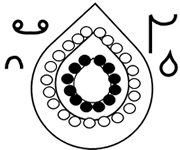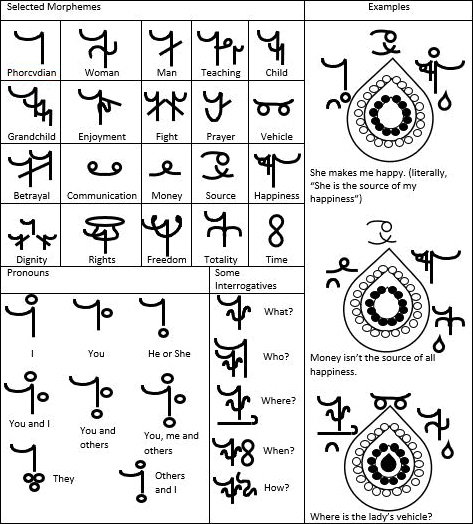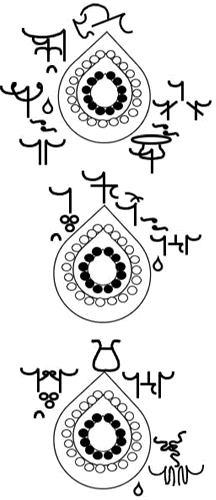
Phorcydian is a logographic script and tactile language created by Brian Loo Soon Hua during the autumn of 2018. Lacking the ability to see, but possessing keen senses of touch, smell and hearing, members of the humanoid Phorcydian race communicate entirely by touch and "write" by secreting long strands of quick-drying resinous saliva that they weave into tear-drop shaped "mandalas" fringed by wire-like logographic glyphs.
Phorcydians are land-dwelling humanoids with smooth, hairless, dark-brown skin. They lack eyes and vocal cords but otherwise possess the usual humanoid arrangement of body parts. Their most striking feature is a writhing mass of fine tentacles, like those of a jellyfish, growing from the back of their heads and reaching below waist level. Some of these tentacles (called “grasping tentacles”) are tipped with teardrop-shaped claspers, similar to the grasping arms of squids. Phorcydians are sensitive to minute vibrations in the air and use their tentacles both for sensory perception and communication. They have a second, smaller mouth at the base of their necks, hidden by their tentacles. This secondary mouth, together with their highly-developed sense of smell, plays a unique role in their “writing” system.
Phorcydians communicate entirely by touch. A “speaker” first places one grasping arm with its clasper-tipped tentacle (the average Phorcydian has about five of these growing among the several dozen other “normal” tentacles extending from the backs of their heads) on the palm, arm, shoulder, neck or cheek of the “listener”. The finer, clasperless normal tentacles then squirm and “dance” around the clasper, forming various glyphs in a specific order to represent pronouns and nouns (the Phorcydian language entirely lacks verbs, adjectives and adverbs!). The amount of pressure and suction exerted by the clasper and the tentacles against the “listener’s” skin is phonemic – heavier suction from the clasper indicates questions, a lighter suction indicates positive statements and a lighter pressure applied by the clasperless tentacles marks negation.
The “written” language (which is not actually written at all) reflects their kinesthetic and tactile mode of communication: the Phorcydian secondary mouth exudes a saliva-like resin that dries quickly when it comes in contact with air. The tentacles spin and mould the setting strands into three-dimensional glyphs and the resulting dried text is incredibly tough and plastic-like. The resin-glyphs can then be passed to other Phorcydians: to be touch-read like Braille messages. They also function rather like the Phorcydian equivalent of shouting – a glyph-message could be imbued with the creator’s scent and then flung at a passing acquaintance in a crowd to get their attention. Writers and poets traditionally created elaborate ropes of resin glyph-stories and glyph-poems that they handed over to professional copiers to be alchemically reproduced and then distributed to patrons and clients.


The totality of Phorcydians are the issue of births with freedom and equality in dignity and in rights. They are bearers of thought and conscience. Their interactions are full of obligation in the spirit of siblinghood.
(Phorcydian version of Article 1 of the Universal Declaration of Human Rights)
Brian’s webpage about the Phorcydian language
Another script by Brian Loo Soon Hua: Undine
Constructed scripts for: Ainu | Arabic | Chinese languages | Dutch | English | Hawaiian | Hungarian | Japanese | Korean | Lingala | Malay & Indonesian | Persian | Tagalog / Filipino | Russian | Sanskrit | Spanish | Taino | Turkish | Vietnamese | Welsh | Other natural languages | Colour-based scripts | Tactile scripts | Phonetic/universal scripts | Constructed scripts for constructed languages | Adaptations of existing alphabets | Fictional alphabets | Magical alphabets | A-Z index | How to submit a constructed script
[top]
You can support this site by Buying Me A Coffee, and if you like what you see on this page, you can use the buttons below to share it with people you know.

If you like this site and find it useful, you can support it by making a donation via PayPal or Patreon, or by contributing in other ways. Omniglot is how I make my living.
Note: all links on this site to Amazon.com, Amazon.co.uk
and Amazon.fr
are affiliate links. This means I earn a commission if you click on any of them and buy something. So by clicking on these links you can help to support this site.
[top]